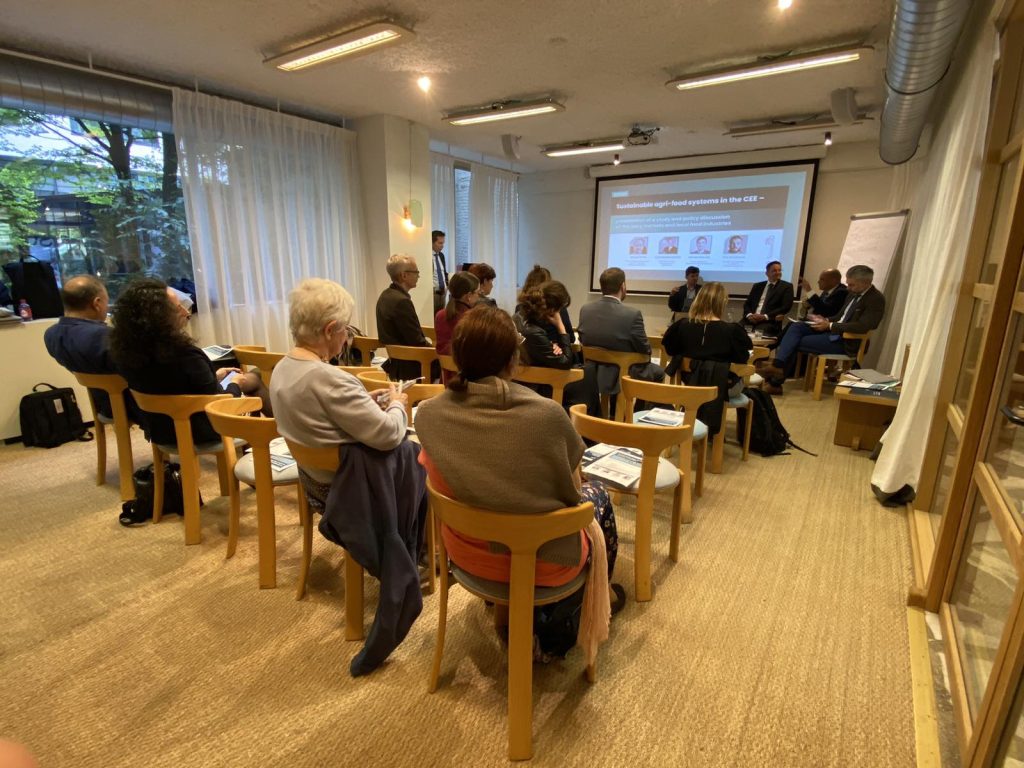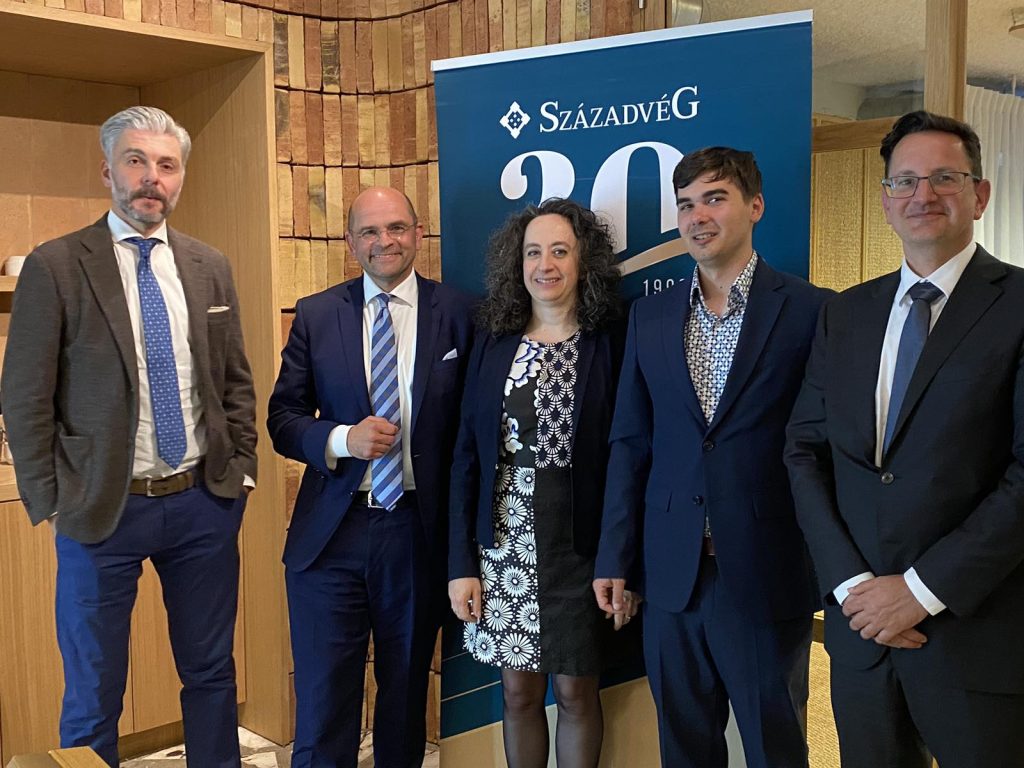Pál Belényesi, from Brussels Consulting, moderating the panel discussion, provided a brief background on the topic. He stated that the dairy sector is the second largest agricultural sector in the EU, responsible for 12-15% of its agricultural output. The EU27, on the other hand, is the largest dairy producing region globally, with 145 million metric tons of products output a year. Raw milk production in Hungary declined by 25-40% in recent years, caused by rising energy prices and inflation, while the sector is also heavily impacted by lack of manpower as well. International surveys show that customers tend to choose dairy products based on their quality, healthiness and taste, and only then based on price, Hungarian customers consider the price of products as being the most important factor when making a purchase.
Kinga Kenyeres, CEO of Századvég, introduced the company to those present and expressed her wish that since Századvég contributes to the support of data-based political decision-making in Hungary with its own research, she hopes that these data and conclusions will also be of interest to non-Hungarian stakeholders and find their path to EU decision-makers.
Dávid Kollár, from Századvég presented the findings of the recent survey on the dairy markets in Hungary. He emphasized the importance of this topic as building sustainable supply chains in the 21st century is of utmost importance, and this does not only serve to protect the environment, but also contributes to improving the competitiveness of companies through more efficient resource management and cost reduction. Results have shown that in the last couple of years, both the producer and processor segments have typically seen an increase in sales, and overproduction is a rare occurrence, furthermore it impacted typically smaller companies with inadequate storage capacities.
Another important finding was that the unit price of raw milk is set by the processors according to the producers, making them vulnerable to the latter, while processors claim they are at the mercy of the retailers. Hungarian customers consider price as being the most important factor when choosing dairy products.
The biggest challenge for the Hungarian dairy sector is the lack of adequate human resources, namely that there is no supply of trained workers. Additional challenges are the high energy prices and rising inflation.
To conclude the study, Kollár stated that the Hungarian dairy supply chain is overall efficient. However, there are many ways to further improve efficiency.
- To correct the market imbalance between producers, processors and retailers advocacy organizations should be created between the more vulnerable groups.
- There is also a need to address the labor shortage by organizing training courses specializing in the dairy sector at the level of vocational training and higher education.
- Addressing the energy crisis should be done by promoting energy efficiency improvements and by a shift towards renewable energy sources.
- SMEs should be supported to undertake infrastructure developments through well-advertised tenders targeted at small producers and processors.

Alexander Anton, the Secretary General of the European Dairy Association (EDA), reflected on the presentation. EDA currently represents dairy associations from 17 countries, and Hungary is not one of them, even though 45% of Hungarian milk is being exported and such products are prevalent on the European market. The Secretary General stated that while inflation and energy prices are temporary problems, every stakeholder in Europe suffers from the lack of adequate human resources. He emphasized the vulnerability of producers to climate change and to international markets. Mr. Anton stated that the vulnerability of stakeholders to each other is a strong word, rather member states should make sure they have strong associations and regulate the relationships between the stakeholders.
The Secretary General mentioned that the European Commission is now supporting and embracing facts backed by scientific research to be taken into consideration when drafting legislation for the agricultural sector.
Mr. Anton explained that he finds that the mandatory origin labelling of products is not compatible with the free EU market, yet it is still present in the EU Farm to Fork Strategy. Additionally, he feels the same about the Front-of-pack nutrition labelling, where he believes the most prominent “Nutri score” would discourage customers from buying dairy products.
The Hungarian dairy sector in his opinion needs to improve itself on multiple levels, such as by increasing production. Additionally, while in other countries dozens of protected geographical labels exist, Hungary only has two such labels, both on cheese.
When asked about the future of the dairy sector in light of the plant-based diet trend, he stated that this forms part of a healthy market competition for which there is room in the market, what he regarded as unfair practises is when plant-based products are marketed as if they contained dairy, such as dairy-free yogurts. When talking about achieving net-zero for greenhouse gas and methane emmissions, he pointed out that emmissions have steadily decreased until the last decade. As for methane, he mentioned that it is circular. These emmisssions can be further reduced by newer feeding tehcniques and feed additives by a approximately 30%.
The last panelist Bence Tóth, policy assistant to the Director-General at DG AGRI of the European Commission stated that his department has a much more limited impact on dairy sector than it had before as none of the policy initiatives regarding the sector is being developed by them. He praised the new Common Agricultural Policy (CAP) as member states have a lot of leeway in how they want to implement the legislation and have the opportunity to look at their challenges and tailor their responses in strategic plans accordingly. Ongoing proposals on the Green Deal are still being shaped to adapt it to the new challenges such as high energy prices, the War in Ukraine or food security. There is a lot of discussion surrounding the Green Deal to make sure there will be real transition which will not be at a detriment of EU economy and food security, and to further make sure that the policy can cater for also short-term challenges not just long-term ones. Mr. Tóth also emphasized the keywords of the Commissioner of DG AGRI for the upcoming period, “4 S”-s: stability, security, sustainability, solidarity.
When asked how to move towards sustainability without negatively affecting the agricultural sector, he pointed out that Horizon Europe’s 9 billion Euro budget can be used for the necessary R&D activities.

Generational renewal is also targeted in the policies discussed by the Commission; however, this depends a lot on factors outside of agriculture.
The average age of farmers is increasing to 57 years old, and while that’s not necessarily a bad thing, only 11% of farms owners are under 40. To counteract the lack of human resources in the sector, the European Year of Skills will cover a lot of initiatives to answer this.
When asked about how to reach the 30% reduction of methane emissions, he stated conditionality first, as for example under the current CAP 25% of direct payments have to be paid towards environmental objectives. They want to reinforce this with the Green Deal, by incentivizing farmers to transition towards sustainability without putting additional burdens on them or alienating them. They would carry this out through impact assessments which would include public consultations to consider the farmers’ views on the planned initiatives.
Participants agreed that there is need for a follow-up research on the sector, approximately, in two years as the Commission and other stakeholders are better informed with primary research that is developed on the spot, rather than summary-booklets.
Watch the recording of the event on our YouTube Channel!
Find the results of the market research on the Hungarian dairy sector here.
